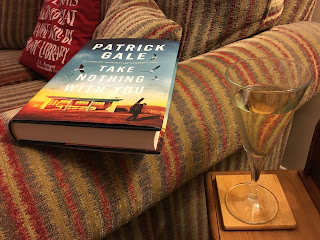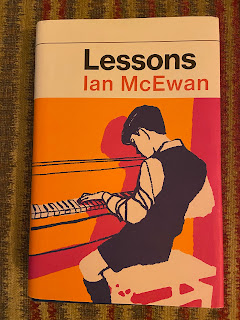'Take Nothing With You' by Patrick Gale
I'm a bit of a Patrick Gale fan so I bought this book, to read on holiday, as a fairly certain bet, and it was an enjoyable read.
It's a book that sandwiches the past between the present, as the protagonist, Eustace, is faced with a serious medical condition and new love simultaneously. Amidst this emotional turmoil,we are taken back to Eustace's childhood, where his emerging sexuality, his love of music, his domestic life in the small retirement home his parents run, and his aversion to sports and academic application, create a sense, that is perhaps more ubiquitous than exceptional, of being different and outside his peer group mainstream.
His discovery of cello playing and the inspirational influence of his cello teacher, Carla Gold, bring music to the forefront of his life, and introduce an alternative, more widely encompassing, social experience. The transition from public to state school is sensitively handled and the discovery that state school offers a decent education and a broader spectrum of social interaction is refreshing.
The relationship between Eustace's mother and Carla, is focalised through the naivety of youth, whilst her reaction to Eustace's homosexuality is brutal, almost to the point of disbelief. The developing relationship between Eustace and his father, who initially seems, through the hormonal fug of adolescent thinking, a sort of amiable buffoon, is strengthened by their mutual hurt into something more mature and substantial.
One of Patrick Gale's strengths, as a novelist, is that he consistently creates characters we care about and who grow and develop in our readerly affections. This book is no exception and we travel the journey with Eustace, wishing him well in past, present and future.
There are a few things that impinged on my enjoyment of the book. For me, subject specific knowledge and research in writing should be like an iceberg with only the tip showing above the surface, and there is more than I need to know about the niceties of cello playing. Also, the demotion of Eustace from imminent professional musician material to lifelong musical hobbyist, is a bit abrupt and not really justified in the novel, leaving the reader feeling a bit disconcerted.
However, whilst the plot is relatively small-scale, the story is well-told and engaging. The final conclusion therefore, has to be in its favour.
Verdict: Read
It's a book that sandwiches the past between the present, as the protagonist, Eustace, is faced with a serious medical condition and new love simultaneously. Amidst this emotional turmoil,we are taken back to Eustace's childhood, where his emerging sexuality, his love of music, his domestic life in the small retirement home his parents run, and his aversion to sports and academic application, create a sense, that is perhaps more ubiquitous than exceptional, of being different and outside his peer group mainstream.
His discovery of cello playing and the inspirational influence of his cello teacher, Carla Gold, bring music to the forefront of his life, and introduce an alternative, more widely encompassing, social experience. The transition from public to state school is sensitively handled and the discovery that state school offers a decent education and a broader spectrum of social interaction is refreshing.
The relationship between Eustace's mother and Carla, is focalised through the naivety of youth, whilst her reaction to Eustace's homosexuality is brutal, almost to the point of disbelief. The developing relationship between Eustace and his father, who initially seems, through the hormonal fug of adolescent thinking, a sort of amiable buffoon, is strengthened by their mutual hurt into something more mature and substantial.
One of Patrick Gale's strengths, as a novelist, is that he consistently creates characters we care about and who grow and develop in our readerly affections. This book is no exception and we travel the journey with Eustace, wishing him well in past, present and future.
There are a few things that impinged on my enjoyment of the book. For me, subject specific knowledge and research in writing should be like an iceberg with only the tip showing above the surface, and there is more than I need to know about the niceties of cello playing. Also, the demotion of Eustace from imminent professional musician material to lifelong musical hobbyist, is a bit abrupt and not really justified in the novel, leaving the reader feeling a bit disconcerted.
However, whilst the plot is relatively small-scale, the story is well-told and engaging. The final conclusion therefore, has to be in its favour.
Verdict: Read



Comments
Post a Comment